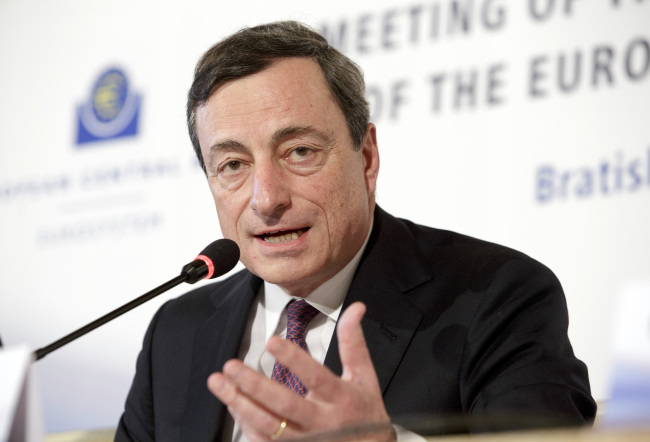European Central Bank President Mario Draghi said that while the economic outlook in the euro area is “challenging,” he still expects a recovery this year.
“There are a few signs of a possible stabilization,” Draghi said in a speech in Shanghai today, according to a text provided by the Frankfurt-based central bank. “Our baseline scenario continues to be one of a very gradual recovery starting in the latter part of this year.”
After reducing the ECB’s benchmark interest rate to a record low of 0.5 percent last month, Draghi signaled he’s prepared to cut again if economic data worsen. While unemployment in the 17-member euro area reached a fresh record in April and the recession deepened in the first quarter, most economists in a Bloomberg News survey said they didn’t expect the ECB’s Governing Council to lower borrowing costs when it meets on June 6.
 |
Mario Draghi, president of the European Central Bank |
“The drivers of such a gradual recovery are the highly accommodative monetary policy and export growth, caused by growing foreign demand,” Draghi said. Recent increases in stock markets are “benefiting virtually all economic agents, including corporations, banks and households,” he said.
As the financial sector is the intermediary between the ECB’s loose monetary policy and the real economy, transparency is needed about the risks that remain on the balance sheets of lenders across the region, Draghi said. That’s a pre-condition for restoring “lasting health” in the banking sector, he said, adding that the central bank can’t help lenders recapitalize.
“It is ― first and foremost ― the responsibility of shareholders to ensure that their bank is solvent and able to sustain its core business,” Draghi said.
“And if the private sector is unable or unwilling to provide the capital necessary to achieve solvency, it is for the fiscal and regulatory authorities to decide whether and how to act.”
Once the ECB conducts an asset-quality review of European banks and before it takes over responsibility for supervision next year, any capital shortfalls will need to be plugged by governments or the region’s bailout fund, Draghi said.
“The national budgets and where needed, the ESM, will have to provide adequate backstop,” he said.
Draghi also defended the ECB’s potentially unlimited and, as yet, unused OMT bond-buying program. The German Constitutional Court will hold a hearing on a case that challenges the OMT’s compatibility with German primary law later this month.
The program, announced in mid-2012, has made the euro area “a more stable and resilient place to invest in than it was a year ago,” Draghi said. “This important improvement largely reflects the removal of unwarranted fears of a systemic collapse of monetary union that was previously priced in by markets.”
(Bloomberg)





![[Weekender] Korea's traditional sauce culture gains global recognition](http://res.heraldm.com/phpwas/restmb_idxmake.php?idx=644&simg=/content/image/2024/11/21/20241121050153_0.jpg)


